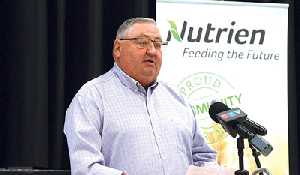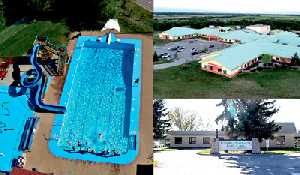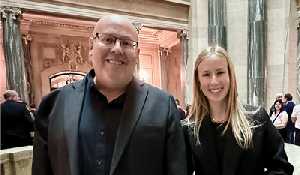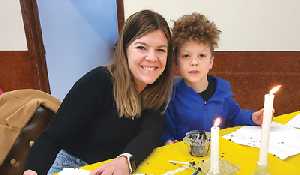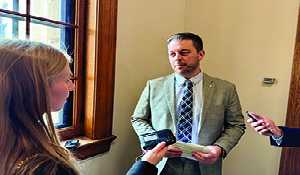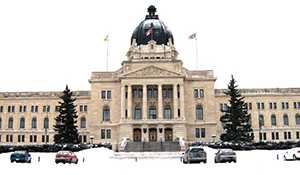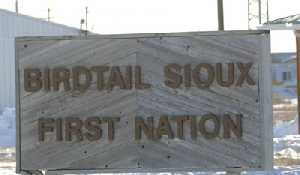Potash tax sharing: Gov’t rejects plea for changes
March 25, 2014, 3:04 am
Kara Kinna


The province of Saskatchewan has rejected a plea from Rocanville, Langenburg and Churchbridge to make changes to the Municipal Potash Tax Sharing formula and to the Municipal Potash Tax Sharing Administration Board.
In a letter dated March 6, the town of Rocanville was informed by Jim Reiter, the Minister of Government Relations, that “Upon careful consideration of your requests, government does not feel it would be prudent at this time to change the current process established for municipal potash tax sharing.”
The letter also stated there would be no changes to the Municipal Potash Tax Sharing Administration Board, in which the towns were hoping they would have some urban representation.
“Based on your original inquiries in 2011, this was discussed by the Board, but no changes were recommended,” read the letter.
The letter was noted at a Rocanville town council meeting last week after Mayor Daryl Fingas, along with representatives from Churchbridge and Langenburg, met with Minister Reiter at the SUMA convention in early February to discuss their concerns regarding the way municipal potash tax revenue is shared, and giving urban municipalities representation on the Municipal Potash Tax Sharing Administration Board.
The towns began pursuing changes to the Municipal Potash Tax Sharing formula back in 2011. Under the Municipal Potash Tax Sharing act, rural and urban municipalities within a 20-mile radius of a potash mine receive municipal tax levies from that mine. Rural municipalities receive 90 per cent of the funds, while urban municipalities receive the other 10 per cent. The funds are distributed by a Muncipal Potash Tax Sharing Administration Board. The board is made up of two representatives nominated by the Saskatchewan Association of Rural Municipalities (SARM), and one representative nominated by the Minister of Government Relations.
The town of Rocanville sent a letter to the provincial government back in 2011 asking them to consider changing the 90-10 split to give urban municipalities a larger share, and to consider giving urban municipalities some representation on the board.
Fingas says the 90-10 split always seemed unfair to the towns. In 2013, the town of Rocanville received $156,707 from potash tax, less than the RM of Moosomin, which received $186,058. The RM of Rocanville received $1,293,845.
The biggest recipient is the RM of Spy Hill, which contains no potash mines, but is within 10 miles of two. It received $1,745,240 in potash tax in 2013.
He adds that the towns have incurred extra infrastructure costs as they tried to keep up with housing projects that were needed as PotashCorp Rocanville underwent a $2.8 billion expansion.
“Years ago we looked at the potash tax revenue sharing, and we just wondered why,” Fingas says. “You always saw the figures that everyone got, and the RMs got one heck of a pile of money, and we wondered why. We know that the potash mine’s out there, but the majority of the people live in the towns—not everybody, but a lot of people do.
“When there’s an expansion, we’ve got to put out money to do new developments, and encourage more people to live here and provide for them. So we just figured that we would go and ask the minister if there could be any changes. We gave our reasons, about housing and all the people.
“In 2011 we met with the minister. It was Daryl Hickie at that time, and we had a good conversation with him. At that time they said they’d take our concerns back to the table and they would discuss it and see what they could come up with.”
However, after a few years passed and the town heard nothing back, Fingas said the town decided to write to the government once again.
“We had a new minster of government of relations, Jim Reiter . . . and we brought it up here last fall again. We inquired if they were going to do anything.
“They said they would set up a meeting again because of the new minister, so we did that at SUMA. We met with him, and Churchbridge and Langenburg reps came to the meeting. We had a good discussion.”
Fingas says even a small change in the tax sharing would have helped towns alleviate some of their infrastructure costs.
“Every year we’ve got to pay interest on the debt to cover the payments for these lots. We do get our money back in the end when we do sell them, but we put out a lot of money we don’t have to make sure we have this infrastructure there to allow poeple move into town, and it’s mainly the interest costs because we have to borrow.
“We looked at the 90 per cent and the 10 per cent and figured it didn’t have to be much more of a split, but a little bit more. We’re always looking for money for things like that. A few more per cent, another five per cent or 10 per cent would have gone a long ways.”
Fingas says that as stakeholders, the towns have always considered the makeup of the Muncipal Potash Tax Sharing Administration Board unfair.
“I don’t think that was ever fair,” he says. “There should have always been representation from the towns and that was one thing we mentioned too, but they never gave any answer to us at our meeting. There are three on the board and they’re all RM people, and there’s no representation from towns.”
Fingas says the meeting at SUMA was a positive one, but he’s not surprised by the outcome.
“We had good discussions with them. They were open for anything we had to say,” he says. “It was a great meeting. Everyone got to say what they wanted and they took our concerns, and we got this letter back now.
“When we finished the meeting, they pretty well said they don’t want to stir the pot. When we first brought this up years ago, the RMs were disappointed in what we were going for and this time around I think maybe the government knows that too.
“After three years passed and nothing happened, we didn’t expect too much at this meeting. We figured they had made up their minds a few years ago, that’s why we didn’t hear anything back. But we just wanted to bring it up again. Seeing there was a new minister, we thought we would be able to change a few things, but not according to the letter.”
In his letter, Reiter states a number of reasons why he believes the current process is fair.
“Government recognizes that there are some considerable start-up costs with building new subdivisions that are not realized until the vacant lots are sold,” he wrote. “However, it was pointed out that once they are filled in, this development increases both the property tax base and the local economy, and makes each community stronger and more vibrant in the long term.”
Reiter also pointed out that urban municipalities can access the Building Canada Fund, and that the federal gas tax and municipal revenue sharing provide urban municipalities with a greater benefit than rural municipalities.
Reiter said that RMs receive more of the potash tax to cover the costs incurred by heavy hauls on rural roads.
“The main focus of the program was to ensure that roads and bridges that are impacted by heavy hauls from the mines would be compensated in a larger area than simply the rural municipality the mine is located in.
“The majority of heavy haul activity is in rural municipalities and therefore the majority of the municipal tax collected from the mines goes to these areas. The tax sharing arrangement has worked efficiently in this regard.”
Fingas, who works for Mosaic Potash in Esterhazy, directly disagrees with this statement, saying most of the heavy haul traffic is relegated to the highways, not RM roads.
“As we discussed last night (at our council meeting), councillor Henry Pierrard and myself both disagreed on that,” says Fingas. “Because the RM doesn’t allow heavy haul on the roads and the majority is on the highway that goes out to the mine. Now they’ve got the new mine at Scissors Creek and it’s the same thing, and the government looks after that. So that’s a part we didn’t agree with.
“Maybe that’s one of the reasons originally. Maybe the potash mines were developed and they just came up with that 90 per cent and 10 per cent because of that, but it isn’t that way today.”
While Fingas is disappointed that the government will not review the Municipal Tax Sharing Potash Act, he says he accepts the decision.
“I can live with it,” he says. “You always look for the betterment of your town and look for extra money for different things, and this is one way and it didn’t happen, and we can live with that too. It was worth trying and pursuing. You don’t get anything if you don’t ask for it.”
He says the town of Rocanville will probably let the issue rest for now.
“I think we’ll probably just leave it as is right now. I’ll have to talk to Churchbridge and Langenburg just to see what their thoughts are. But it’s nothing really pressing right now.”

